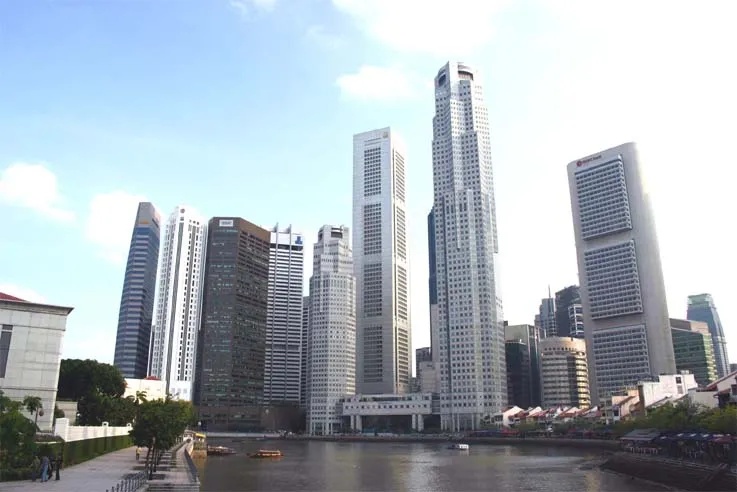
Tenants bullish on Asia Pacific office property markets
Singaporeans put more emphasis on cost savings when choosing an office space than other nationalities.
International property consultant, Colliers International’s 2010 Asia Pacific Office Tenant Survey – which covers a total of nine countries across the region, including Australia, China, Hong Kong, India, Indonesia, New Zealand, Singapore, Taiwan and Thailand – revealed tenants’ optimism in the office property market in each of their countries.
All countries, except Thailand, perceived its local office property market to be well past the market trough and is heading towards an upswing.
Mr Mark D Lampard, Regional Director, Corporate Solutions, Asia, of Colliers International, says, “After going through the economic uncertainty of the global financial crisis, tenants in Asia Pacific are generally optimistic about the economy and their prospects for growth. From a demand perspective, the office property market cycle across the region is improving, although most tenants are still very focused on cost savings; which, in turn, is impacting their choice of office accommodations.”
The Survey was conducted in 2Q 2010, and was completed by 740 office tenants, including 389 across Asia and 351 in Australia and New Zealand.
Key Survey Findings:
All countries in Asia Pacific, except Thailand, perceive their local markets to be moving towards the upswing of the office property cycle
Tenants’ confidence in the office property market is brimming across the region – as reflected by their perception of where they deem the position of their market on the property clock – which has 12 o’clock representing the market peak, 3 o’clock for downswing, 6 o’clock for trough and 9 o’clock for upswing.
All countries, except Thailand, perceived the market as past the 6 o’clock trough and moving towards the 9 o’clock upswing. Tenants in Hong Kong exhibited the most confidence in their market outlook with an average clock time of 10 o’clock, signifying that Hong Kong is already on its upswing and heading towards the next boom.
In Singapore, the average clock time sits at 7 o’clock, indicating that the local office market is moving towards an upswing.
Mr Calvin Yeo, Executive Director of Office Services, Colliers International, says, “The general sentiments in the Singapore office market have been optimistic. We are currently seeing rents pushing towards a double-digit level. As of 3Q 2010, on the back of growing business confidence, average rents in Raffles Place have increased by some 17.8 per cent since 4Q 2009 to S$8.07 sq ft, with an average occupancy at 97.4 per cent.”
Fading impact of the Global Financial Crisis (GFC) on office tenants’ leasing decision making
Although an average of 52 per cent of the tenants surveyed claimed that the GFC still had a considerable impact on their leasing decisions, the situation varies considerably across countries.
While Indonesia, Taiwan and Thailand reported that the GFC still has a strong impact, the situation is reversed in countries including Australia and New Zealand, China, Hong Kong, India and Singapore.
Australia and New Zealand collectively is the most optimistic with 83 per cent of the tenants indicating that the GFC no longer has an effect on their leasing decisions. This is followed by Hong Kong (62 per cent), India (58 per cent), Singapore (57 per cent) and China (52 per cent).
Mr Yeo shares, “In Singapore, we are seeing many tenants providing for expansion space in their new leases, as seen in the increase in island-wide net new demand from a negative demand of some 248,000 sq ft in 2Q 2009, to a positive of some 398,000 sq ft in 2Q 2010.”
Cost savings is the most significant factor in office choice across Asia Pacific, with Singapore giving it the most emphasis
While building attributes – such as being situated in an accessible location, good air quality and high security – ranked high in the selection of office space across the region, it is interesting to note that office cost still outweighs all these attributes.
Compared to other countries, tenants in Singapore place much emphasis on office cost savings when making their leasing decision – with 65 per cent of the respondents indicating that cost savings outweighs other important factors in office space selection. This is followed by Taiwan (60 per cent) and Hong Kong (51 per cent).
Mr Yeo comments, “One of the reasons why office tenants in Singapore seem to be more cost conscious, as compared to the rest of the region, could be attributed to the recent market volatility.
Office tenants in Raffles Place previously experienced average rents climbing by some 158.5 per cent from 3Q 2006 to a historical high of S$17.89 per sq ft per month in 3Q 2008, causing a significant impact on business cost. This was followed by an acute downturn caused by the GFC that saw rents crashing by some 61.7 per cent to S$6.85 per sq ft per month in 1Q 2010. Consequently, this volatility has resulted in many tenants increasing and maintaining their cost consciousness.”
Singapore lags behind other countries in environmental sustainability when selecting buildings for occupancy
In Asia, office tenants in China, India and Taiwan pay relatively more attention on green elements of their office – with more than 40 per cent of the tenants surveyed indicating that their organization adopts a process in evaluating a building’s environmental performance when selecting a building for occupancy.
On the contrary, Singapore lags behind other countries in this area, with only 11 per cent of the tenants surveyed indicated that their organization would evaluate a building’s environmental performance.
Mr Yeo says, “Although Singapore is currently lagging behind other countries in evaluating environmental sustainability attributes as a building selection criteria, we are seeing larger MNC tenants already taking the lead in this aspect. We expect subsequently that such importance will progressively cascade down to a wider spectrum of office tenants with increasing global awareness.”
The most cited factors driving organizations’ decisions to occupy a green building include corporate social responsibility and operational cost savings.
Flexible lease terms will entice office tenants across the region to relocate within the next five years
57 per cent of the tenants surveyed revealed that they would consider relocating within the next five years, given more flexible lease terms. Other factors include a change in business needs (expansion, consolidation or decentralization), a more convenient building location and a flight to quality, among others.
Mr Yeo ends, “In conclusion, specifically for Singapore, the office market is expected maintain its growth in the last quarter of 2010, albeit at a moderate pace of not more than 10 per cent.”



![SBR 5 Lorem Ipsum News 2 [8 May]](https://cmg-qa.s3.ap-southeast-1.amazonaws.com/s3fs-public/styles/exclusive_featured_article/public/2025-05/a_hand_pointing_to_a_futuristic_technology_5b87c9d0e3_3.png.webp?itok=M3Hf-9XR)
![SBR 4 Lorem Ipsum [8 May Top Stories]](https://cmg-qa.s3.ap-southeast-1.amazonaws.com/s3fs-public/styles/exclusive_featured_article/public/2025-05/a_hand_pointing_to_a_futuristic_technology_5b87c9d0e3_2.png.webp?itok=2m5Wl0MX)


![Exclusive three SBR 12 Lorem Ipsum [8 May]](https://cmg-qa.s3.ap-southeast-1.amazonaws.com/s3fs-public/styles/exclusive_featured_article/public/2025-05/a_hand_pointing_to_a_futuristic_technology_5b87c9d0e3_11.png.webp?itok=8kn_UIfA)
![SBR 3 Lorem Ipsum [ Exclusive 2]](https://cmg-qa.s3.ap-southeast-1.amazonaws.com/s3fs-public/styles/exclusive_featured_article/public/2025-05/a_hand_pointing_to_a_futuristic_technology_5b87c9d0e3_1.png.webp?itok=YCyjLegJ)
![SBR 2 Lorem Ipsum [8 May]](https://cmg-qa.s3.ap-southeast-1.amazonaws.com/s3fs-public/styles/exclusive_featured_article/public/2025-05/a_hand_pointing_to_a_futuristic_technology_5b87c9d0e3_0.png.webp?itok=_cKD-29o)

![Video [Event News]](https://cmg-qa.s3.ap-southeast-1.amazonaws.com/s3fs-public/styles/event_news_featured_article/public/2025-05/screenshot-2025-05-08-at-4.58.53-pm_0.png.webp?itok=Kud35sMs)
![Event News SBR 9 Lorem Ipsum [8 may]](https://cmg-qa.s3.ap-southeast-1.amazonaws.com/s3fs-public/styles/event_news_thumbnail/public/2025-05/a_hand_pointing_to_a_futuristic_technology_5b87c9d0e3_8.png.webp?itok=DTh_dbYp)
![Event News SBR 9 Lorem Ipsum [8 May]](https://cmg-qa.s3.ap-southeast-1.amazonaws.com/s3fs-public/styles/event_news_thumbnail/public/2025-05/a_hand_pointing_to_a_futuristic_technology_5b87c9d0e3_7.png.webp?itok=vzDAzb6V)
![Event News SBR 8 Lorem Ipsum [8 May]](https://cmg-qa.s3.ap-southeast-1.amazonaws.com/s3fs-public/styles/event_news_thumbnail/public/2025-05/a_hand_pointing_to_a_futuristic_technology_5b87c9d0e3_6.png.webp?itok=jvHFc4P6)
![Video [Event News]](https://cmg-qa.s3.ap-southeast-1.amazonaws.com/s3fs-public/styles/video_thumbnail/public/2025-05/screenshot-2025-05-08-at-4.58.53-pm_0.png.webp?itok=yZnI0YBb)
![Video 1 SBR [8 May]](https://cmg-qa.s3.ap-southeast-1.amazonaws.com/s3fs-public/styles/video_thumbnail/public/2025-05/screenshot-2025-05-08-at-4.58.53-pm.png.webp?itok=9AAeRz_k)

 Advertise
Advertise

